The 10 best small business phone systems for 2025

Senior Product Marketing Manager, UCaaS

Share
For small business owners, one of the most important pieces of equipment or software is your phone system. You’re probably going to be using it every day, and if you choose the right one, it can give you a big competitive advantage.
After all, every business needs, well, business communications. Being accessible to clients, suppliers, and employees is a must-have—and it’s something that small businesses can do just as well, if not better, than large enterprises.
Well, if you’re using the right phone solutions, that is. So, how do you choose the right one? What advantages do different telephone systems and service providers offer?
In this post, we’ll break down what to look for in a small business phone system (while keeping budget considerations in mind), where you might be able to compromise, and what features you probably shouldn’t skip.
Unified Communications for Small Businesses
Talk, message, meet, and support customers—all in one beautiful workspace.
What is a small business phone system, exactly?
First, let’s look at what a small business phone system is.
And no, it’s not just your mobile phone.
Technically, a small business phone system is a telephony solution that allows your company to make and receive outbound and inbound business calls (at a very basic level). But beyond that, you’ll also probably need something that lets you transfer and forward calls to, say, your personal mobile phone.
If you’re like most small businesses, you’ll probably choose between two main types: a business VoIP (voice over internet protocol) service that uses softphones or IP phones, or a PBX system (private branch exchange) that uses traditional phone lines.
VoIP phone system: The more advanced—and hands-off—option. It uses your internet connection for phone calls, you can pay as you go without much (or any) upfront investment, and it’s easy to set up. These usually come with “softphone” apps that you can use on desktops, Android or iOS mobile phones (and even other mobile devices like iPads).You might also come across phone systems that describe themselves as “unified communications” platforms. This is a newer term, and usually these types of phone systems come with other communications channels too, like SMS and instant messaging.
PBX systems: The more investment-heavy option. Typically you need to buy more hardware up front and you’d need to pay an IT person to come in and help you with changes like adding users or updating voicemail settings. (Some PBX systems have evolved and are better about this, but generally PBX systems do require more work.)
👉 Dialpad tip:
If you have a distributed or remote team, or you need to make lots of international calls because your customer base is in different countries, then a VoIP solution is probably your best choice.
It’s important to keep in mind that business phone systems are about more than just the ways you place calls, or the devices you use to do so. They’re all about connecting your business with clients or customers, as well as partners, remote employees, and anyone who happens to be overseas for the month.
In other words, they’re the very foundation that a modern communications-based business is built on.
9 features that a small business should think about when shopping for a phone system
Phone systems are becoming more sophisticated all the time. It’s a good idea to be aware of the kinds of features and bonus functionalities that you could be taking advantage of before you start the search for your new business phone provider.
These are nine of the most important and helpful features to look for in an office phone system for small businesses.
1. Call forwarding to your mobile phone
If you’re not always at your desk and usually taking calls from your mobile phone, this is one of the top features you’ll need.
In Dialpad, you can add your mobile phone number really easily in your Settings in two clicks. Now you can make sure that your calls are automatically forwarded to your mobile phone:

This is a useful feature for a number of reasons. Firstly, anytime you’ve got technical problems with a phone or other device, you can route all calls away from that device instantly.
Secondly, it’s a great way to ensure that calls that would otherwise go to employees that aren’t present, still get taken. Let’s say that your employee is sick for the week, but was meant to be taking important calls. All you’d need to do is adjust the routing settings, and those calls would be sent directly to someone who’s available.
2. Easy call transfer (and call routing)
Again, if you run a small business, you’re probably busy and stretched way too thin. Which means you can’t possibly answer every single call you get.
But what if it’s an important client or prospect? You don’t want to miss those calls. This is where a call transfer or call forwarding option would come in handy, and you can set up your calls to go straight to your office manager, or secretary, or even sales team if you don’t pick up.
With Dialpad, you can choose for calls to be forwarded to up to five numbers (landline phones or mobile)—even if they’re not Dialpad numbers!
Whether it’s your colleague’s mobile device or desk phone, a good phone system can make sure that your small business pretty much never misses a call again.
3. The ability to keep your existing business phone number
Unless you’re starting a brand new business from scratch, you’ll need the ability to port over your existing business number. Why? Because the last thing you want is to make your customers and suppliers update your phone number that they already have saved in their contact list.
With Dialpad, it’s simple to port over your existing numbers to ensure continuity. Less work for your clients because they don’t need to update the number they’ve saved for you, and less work for you because you don’t have to spend time changing the numbers displayed on your website or other portals.
4. Cloud-based capabilities and compatibility with your mobile device
A cloud phone system is essentially a phone system that isn’t tied to one location or office. With a cloud phone system, you can make calls from anywhere.it usually comes with a mobile and desktop app, and any software updates will automatically be installed without IT help.
This “easy to use-ness” in terms of setup and admin is a big advantage of using cloud-based systems because you can easily do things like add a new user or new hire to your phone system—yourself.
For example, here’s how easy it is to manage the admin side of a phone system in Dialpad when you want to change an employee’s business number, edit extension numbers, and more:
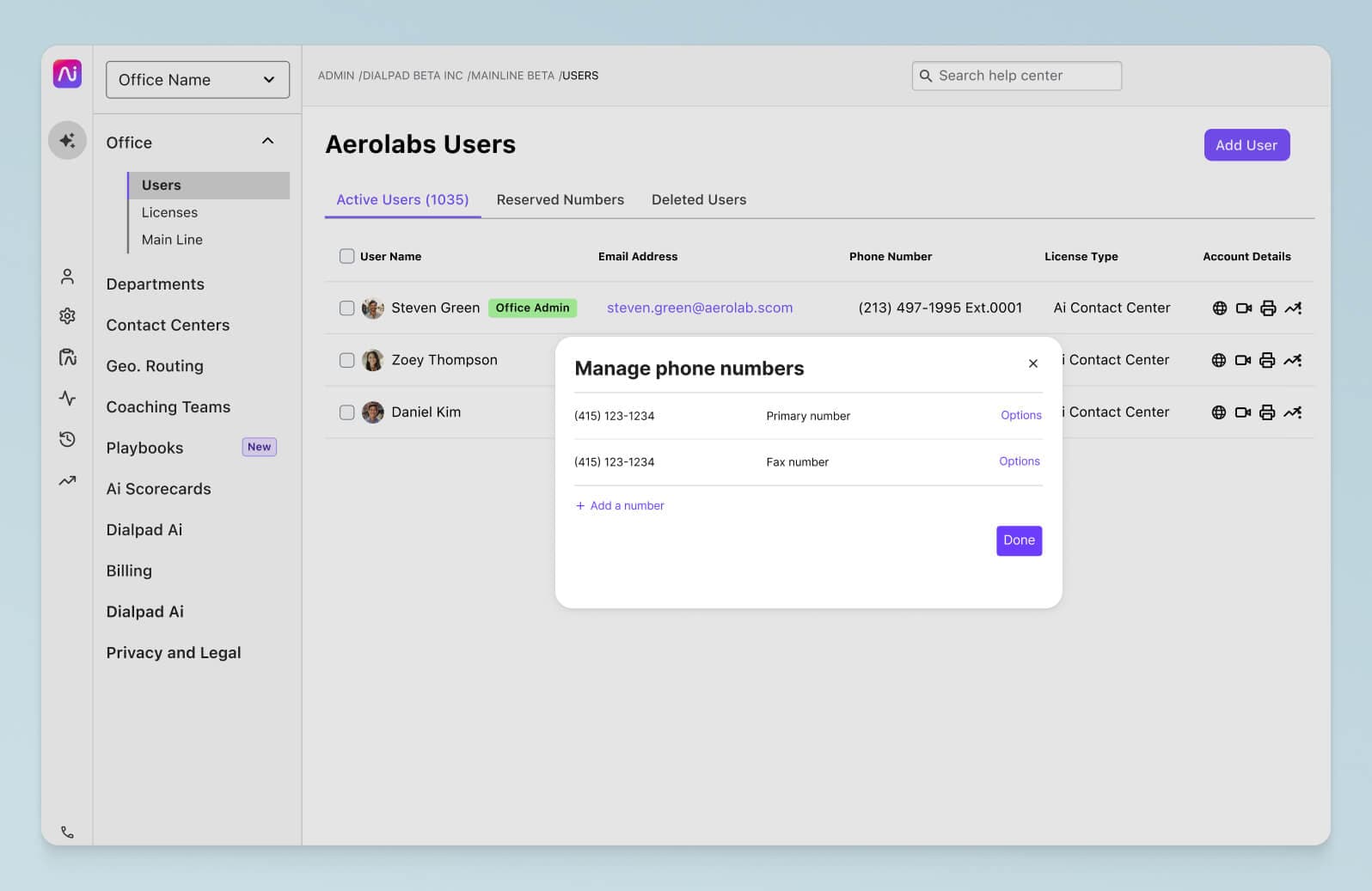
If you want unlimited flexibility and functionality, you’ll definitely want a phone system that’s cloud-based and plays nice with mobile devices and handsets. That’s pretty much a non-negotiable.
👉 Dialpad tip:
That “anywhere” accessibility could be annoying if you’re relaxing on a beach on the Gold Coast, so you may want to turn your phone off if you’re taking some well-deserved PTO.
5. Caller ID
This is a basic one to have. Everyone screens incoming calls nowadays—no one wants to pick up a telemarketer’s call. In Dialpad, for example, you can choose which caller ID to show when you call someone:
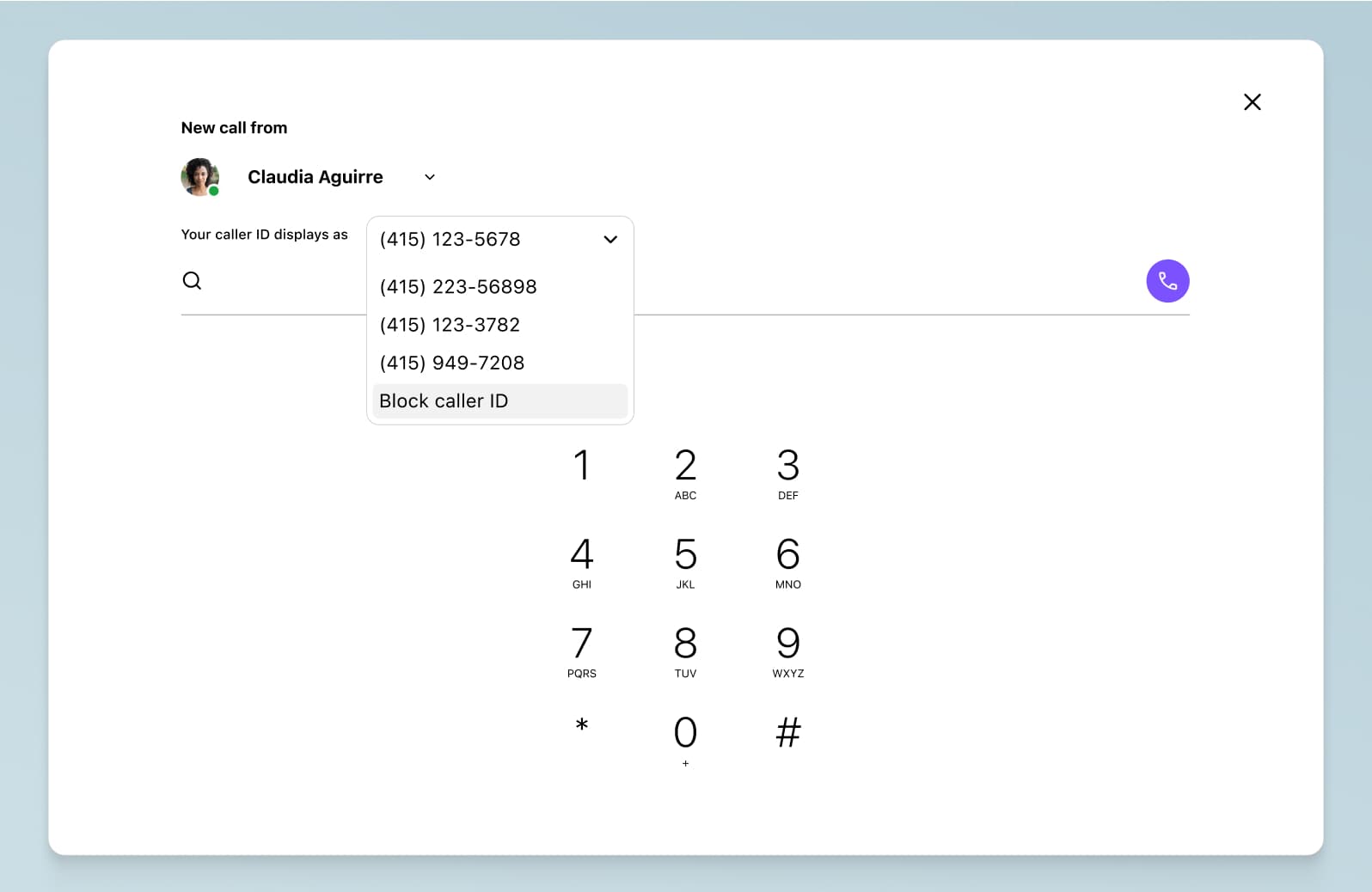
Neat, eh?
Customising the way you appear to the people you call adds a new layer of flexibility to your phone system.
That’s particularly helpful if you’re someone who places a lot of calls at work. You get to set the tone before your recipient even picks up the phone, based on whether you’re appearing as Firstname Lastname, Mx Lastname, or ‘customer support’.
6. In-call security and encryption
If your calls involve discussion of sensitive data and information, then you’ll want some level of security. Ideally, you want enterprise-grade security levels—always check with your provider to see what their security features are like.
👉 Dialpad tip:
For a hands-off approach to security, ensure your provider includes that enterprise-grade security with all your calls, automatically. That way, you’ll never have to manually adjust any settings in order to enjoy total security in every call.
7. Visual voicemail
If you’re a busy person and miss phone calls sometimes or can’t always find time to listen to all your voicemails, you’ll want this.
Visual voicemail is basically a feature that transcribes your voicemails to text, which means you can read them at any time (like during a meeting).
Dialpad Ai technology transcribes not only your calls in real-time (more accurately than almost all competitors out there), but also your voicemails—and even gives you the option of forwarding voicemails too:
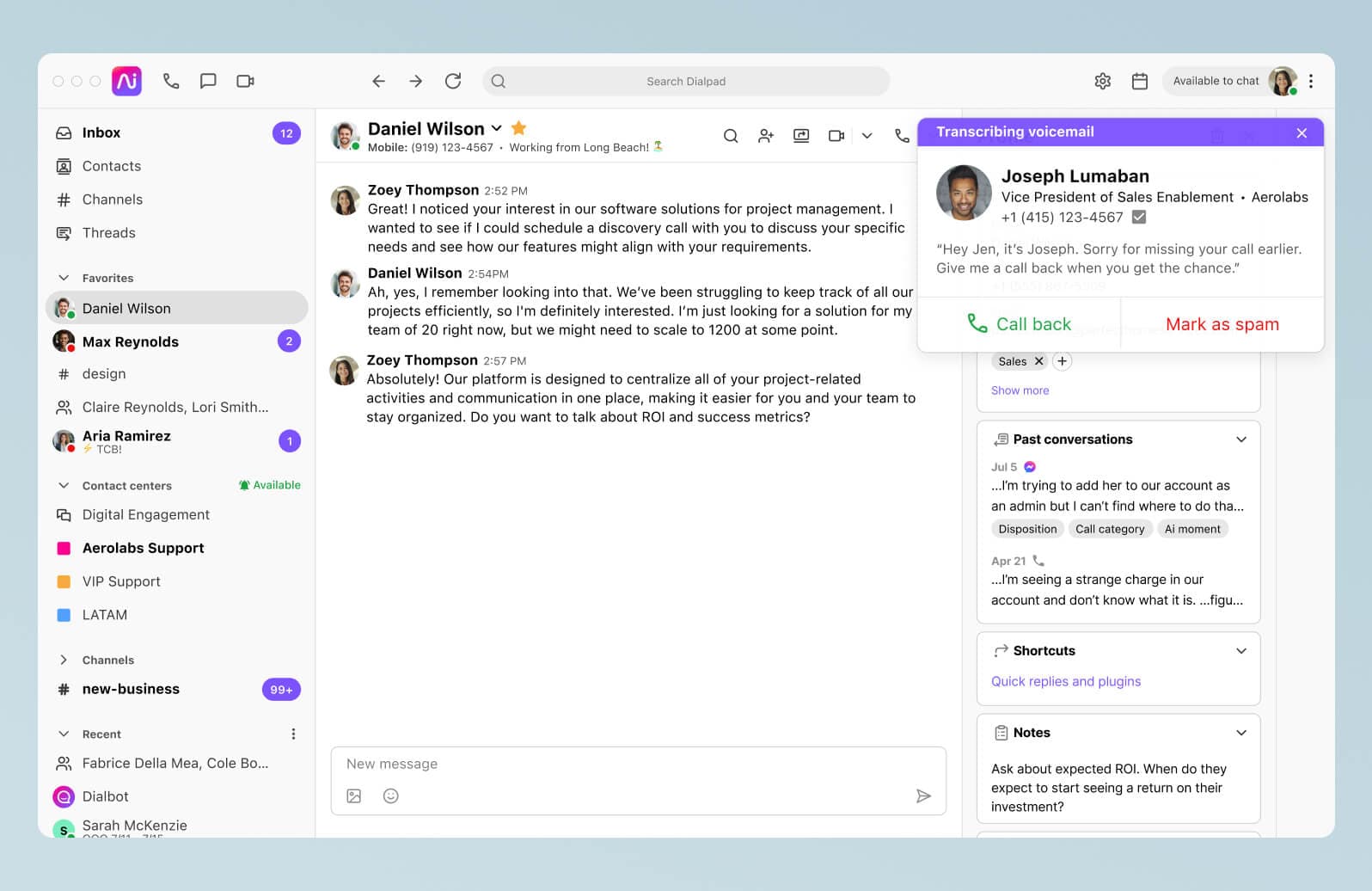
8. Call recording
Call recording is a useful feature to have for some small businesses. Not everyone will use this, or use it often, but if you close deals on the phone or do lots of pitches over the phone, having recordings is useful because it allows you to review calls in the future.
Whether you need evidence for important issues discussed on a client call or you want to analyse calls to see how you can improve a pitch in the future, call recordings make all of that easier.
9. SMS (internal and external)
Ah, texting. Everyone does it today, and some people even prefer texting to calling. Can’t blame them—it’s super convenient.
If you work with clients or prospects who also prefer texting (or you yourself would rather text), then look for a phone system that lets you send SMS messages from the app.
For example, did you know that you can use Dialpad’s app to not only make phone and video calls, but also send SMS texts? We actually have a customer that’s a school that uses this feature to text students (because if there’s anyone who loves texting nowadays, it’s Gen Z):
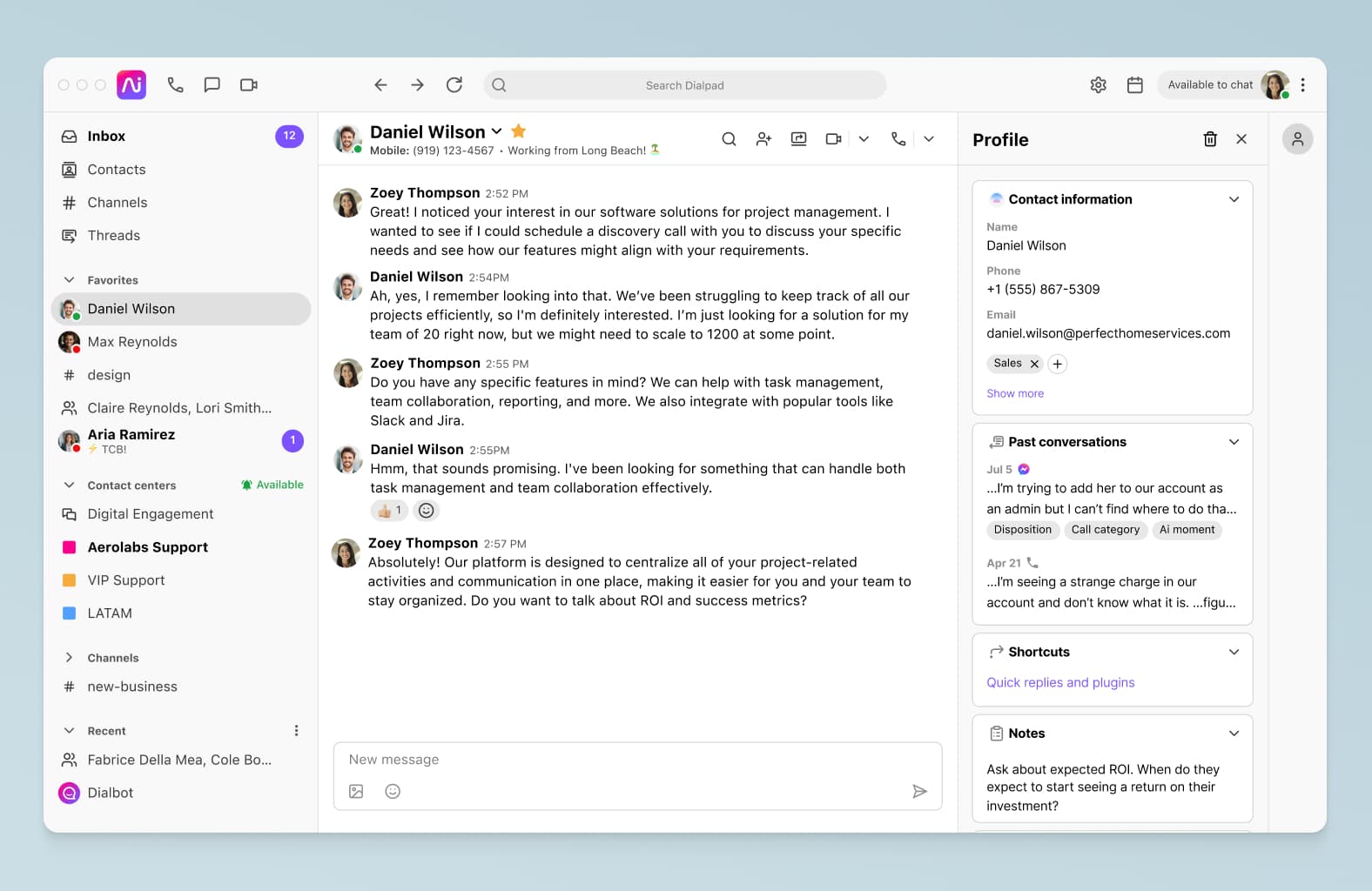
The 10 best small business phone systems on the market
1. Dialpad
Dialpad is an AI-powered, cloud-based business communications platform that has a built-in phone system. And it's designed for small businesses (and even enterprise-level organisations) that need an easy-to-use, deploy from anywhere phone system.
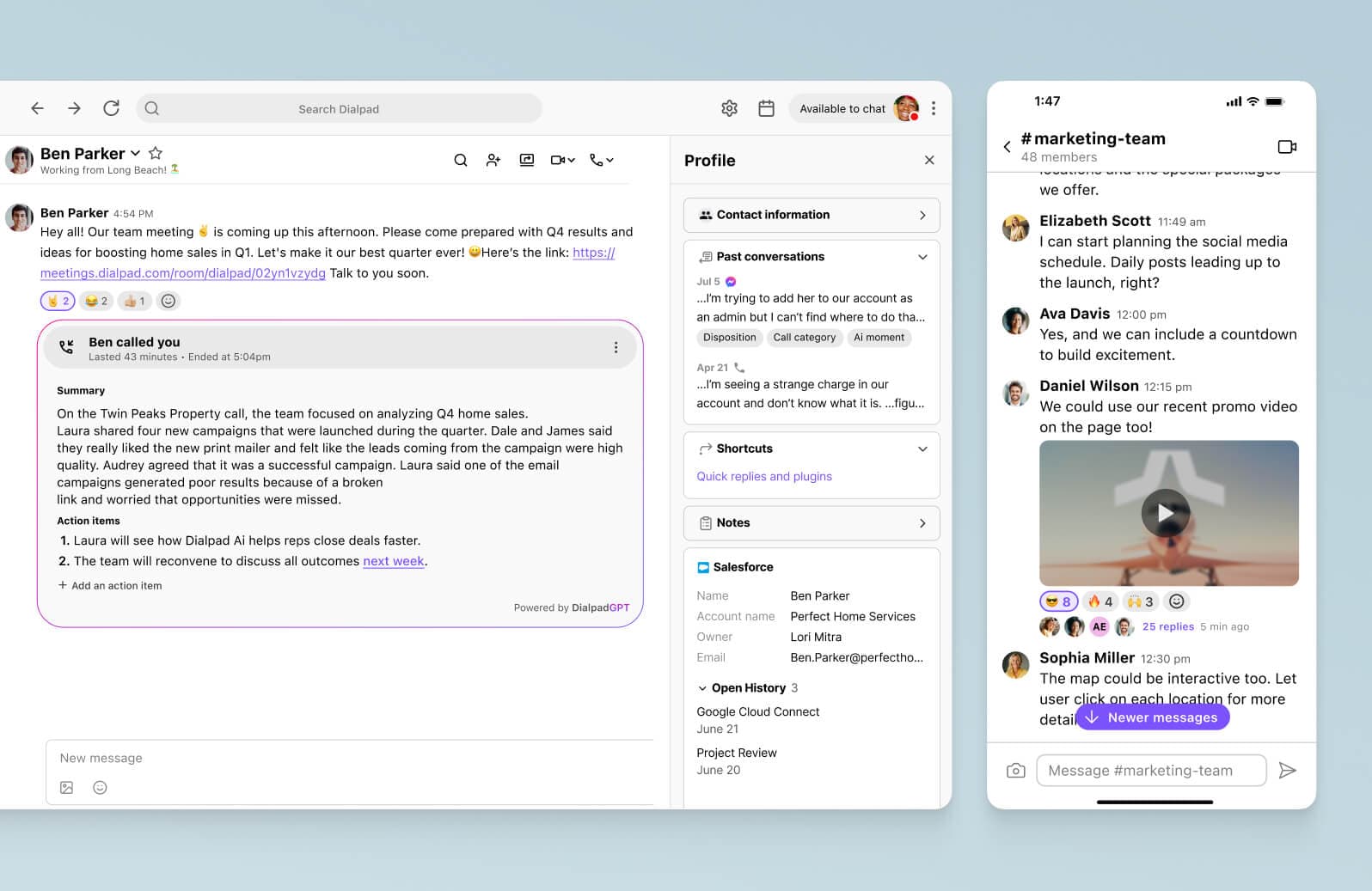
Dialpad also comes with a major advantage over other competitors: It’s a cloud-native, true UCaaS solution where all your communication channels, service maintenance, support, and upgrades are all handled within one company. Its contact centre solution? Built in-house. The AI? Built in-house. That means never having to wait for external companies to make changes or get technical support—that’s all handled within a single app, and Dialpad’s got you covered.
Features:
Easy administration and scalability: No IT? No problem. Dialpad is easy for admins to set up and manage with minimal help. You can add and set up new phones and users in minutes—without hiring an expensive IT consultant.
High call quality: Because of Dialpad's global voice network and unique dual cloud architecture, it ensures a level of call quality from pretty much anywhere in the world
HDconference calls—with video: High quality audio and video capabilities to enhance all your virtual meetings.
SMS and instant messaging: Text people both internally and externally from your Dialpad account. If the person you're texting doesn't have the Dialpad app, no sweat! They'll just receive your message as an SMS.
Cloud-based mobility: Stay connected with any device from anywhere. Unlike many other platforms that only let you join calls from a browser, Dialpad is browser-based, meaning you can do anything in a browser—just like you'd do in the app:
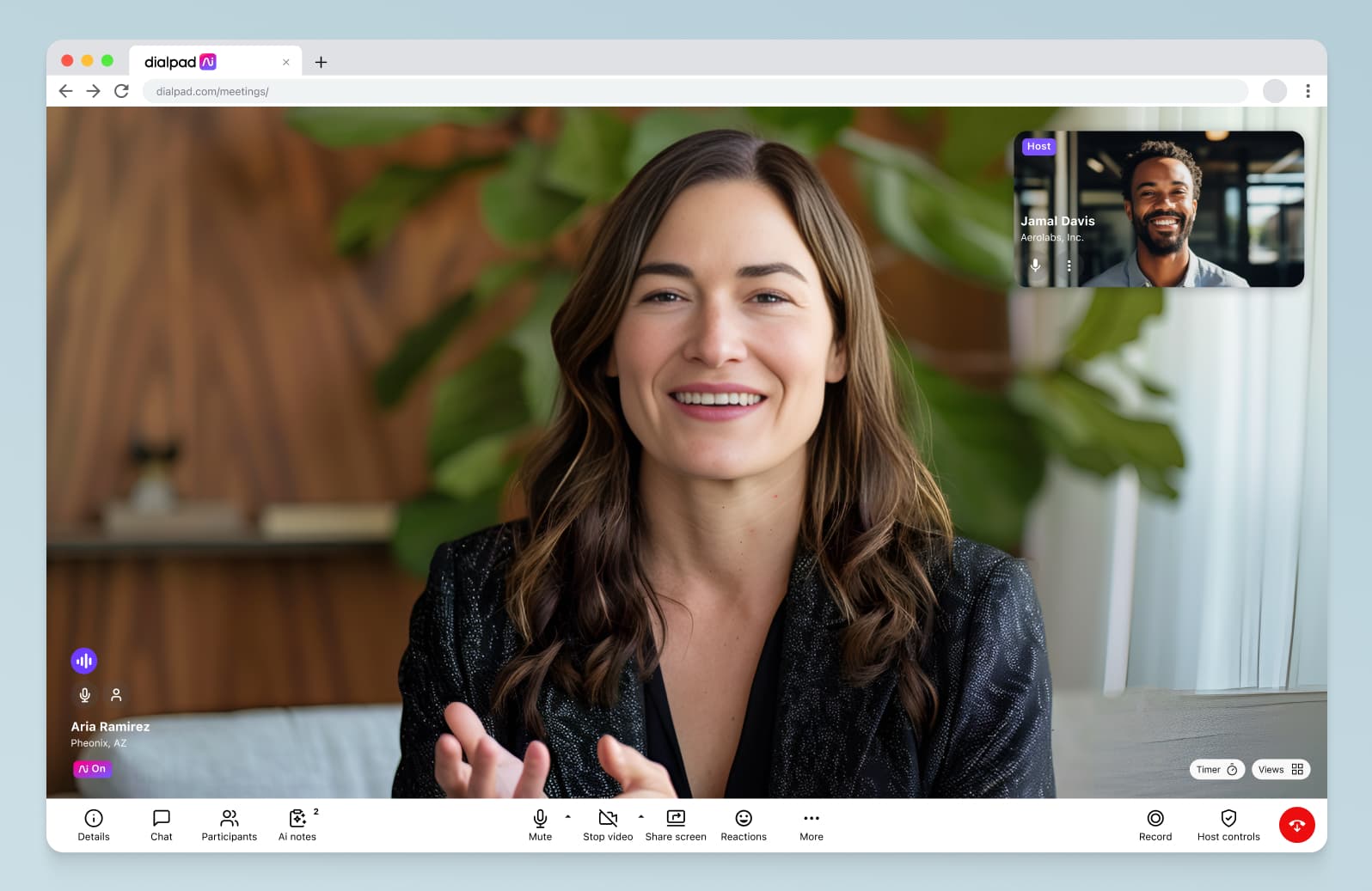
Call waiting
Worldwide customer support: 24/7 live chat support and 24/5 phone support—around the world,
Integrations: Even with the Standard plan, you can integrate Dialpad with Microsoft 365 or Google Calendar, which makes for easier scheduling
Portability: Keep all your original numbers when you move to Dialpad.
Awesome hold music options (or go custom):

Contact centre solutions like IVR, queuing, recording, and analytics.
Call transfer: Forward, transfer, or route calls according to your needs.
Auto attendant: Dialpad's virtual receptionist handles and directs calls in real time according to your settings.
Local numbers: Help build your brand’s profile by assigning local numbers.
Voicemail: Audio and visual voicemail options keep you up to date with missed calls
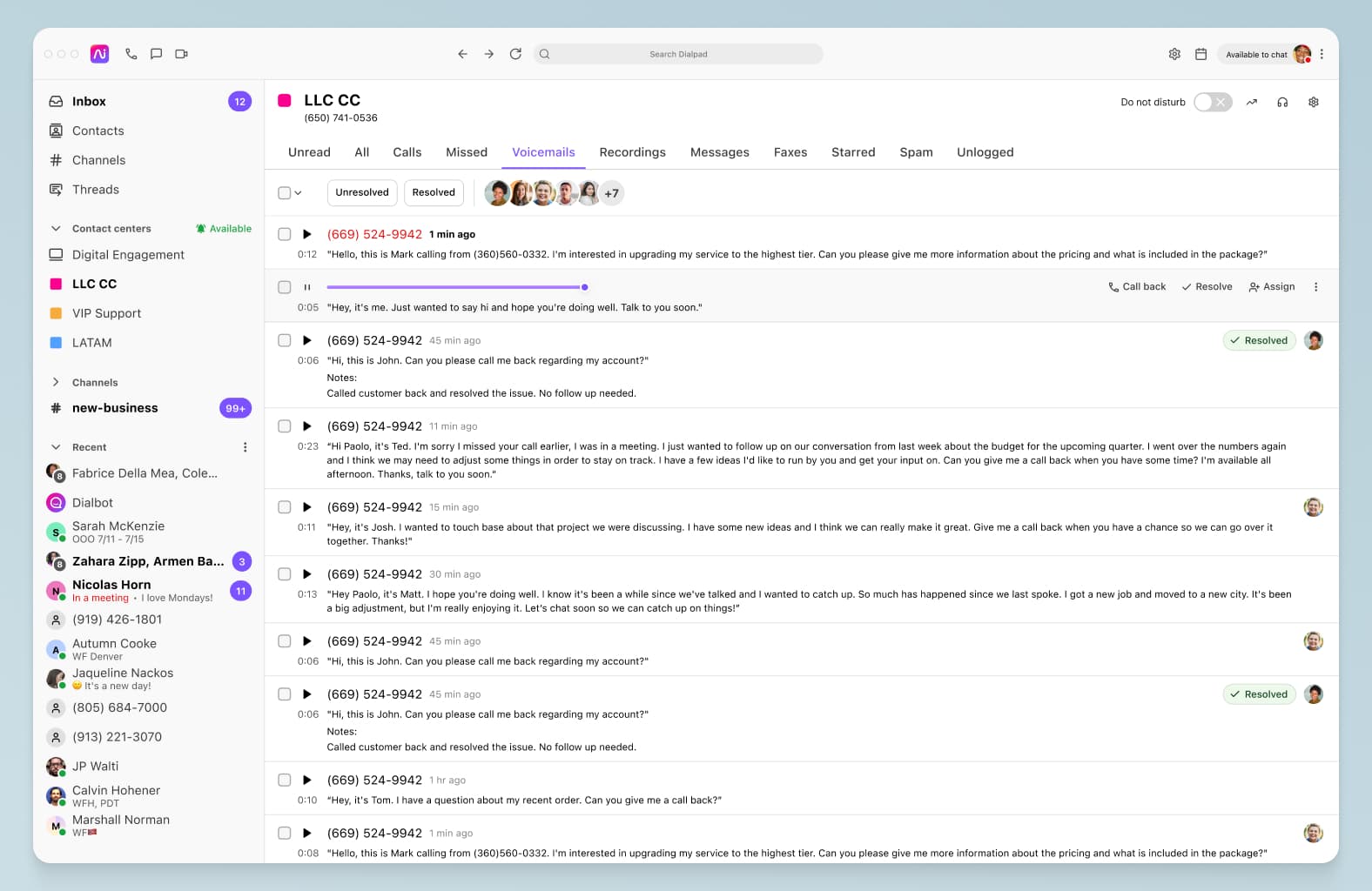
Pricing:
Standard plan at $20/mo/user, Pro plan at $35/mo/user—or sign up for a 14-day free trial (it takes just a few minutes and you'll get set up with a virtual phone number!)
Security features:
SOC2® Type II compliance
Member of the Cloud Security Alliance (CSA) Security, Trust and Assurance Registry (STAR)
Customisable retention policy
Admins control access to data
Data ownership and reporting
Enterprise-level encryption on calls and data stored in the cloud
But hey, don't just take our word for it. See what other happy small business customers think about Dialpad on G2:

Looking for the best small business phone system?
With Dialpad, you get not just phone calls, but also video meetings and messaging. Test-drive it with a 14-day free trial! Signup takes just a few minutes, and you'll get set up with a virtual phone number!) Or, take a self-guided tour to play around with it on your own first!
2. GoTo (formerly known as GoTo Connect)
GoTo combines a VoIP phone system with video, audio, and web conferencing.
But, it offers less responsiveness from customer support and sales than you get with more customer-support-focused providers—and there is no option for multi-line call forwarding (something Dialpad does offer).
Features:
Streamlined support for contact centres
Cloud branch exchange
International calling
Caller ID
Video conferencing
Personal meeting rooms
Pricing:
Standard level starts at $20 AUD per user per month1
3. 8x8
8x8 offers a single platform for cloud contact centres as well as audio, video, and text messaging solutions.
Some customers, though, have complained that there’s no ability to automate the deployment of the app, which makes it a bit time-consuming to set up. The interface is also not the greatest and can be hard to use.
Another interesting thing about “long-established” phone system providers like 8x8 is that yes, they have been around for a long time and position themselves as leaders, but the flip side of that is these leaders’ telephony infrastructure tends to be outdated, which can result in poor call quality and reliability. Just something to look out for if you’re considering these options.
Features:
Multi-level auto attendant
Call recording ability
Audio and visual voicemail
Caller ID
Call forwarding and transfers
Analytics
Easy admin
Pricing:
The 8x8 X1 plan (basic) costs $24 AUD per month per user. The X Series X2 plan (pro) costs $49.00 per month per user and the X4, capable of advanced call handling and analytics, is $83 AUD per user per month.2
👉 FURTHER READING:
See how Dialpad stacks up against 8x8!
4. Aircall
Aircall is a cloud-based phone service that markets itself as a flexible business phone system. Unlike Dialpad, it isn't a unified communications platform that combines phone services with video calling and other features. If you don't need to have video meetings then this might not be a dealbreaker for you.
Features:
Call recording
Voicemail
Parallel calls
Reporting
Shared contacts and call inbox
CRM integrations
Ring groups
Business phone number
Call forwarding and transfers
Voicemail
Pricing:
Essentials Plan starts at $45 AUD per month3
5. RingCentral
Like Dialpad, RingCentral is a unified communications-as-a-service (UCaaS) solution that offers a wide range of tools. Unlike Dialpad, the basic plans don't offer any integrations, which might be worth considering if you're a smaller business and don't need the enterprise plan.
Features:
Desktop and mobile apps
Local, freephone, and vanity numbers
Voicemail to email and visual voicemail
Collaboration
Voicemail and greetings
Business SMS and MMS
Integrations
Internet fax
Pricing:
Premium plan is $45.99 AUD per user per month4
👉 FURTHER READING:
See how Dialpad stacks up against RingCentral!
🗒️ See what IT leaders look for in a phone system
Grab the CIO Buyer's Guide, (written by our own CIO, who's done a lot of phone system shopping in her time!), which will walk you through what features to look for, nuances to pay attention to when comparing providers, and more!
6. Vonage
Vonage is another basic VoIP provider that's designed to be a replacement for landline phone systems. That means if you want basic features like call recording and visual voicemail (not to mention business essentials like video calls, conference calling or group calls, or text messaging), you'll need to pay for add-ons.
With a lack of features compared to other more robust phone systems on this list, this isn't really a solution that offers much to a business beyond a basic phone service.
Features:
Clear calls
Easy to set up
Good customer support
Toll-free number available
Call blocking
Pricing:
Their Lite plan is $15 USD per month per user, Smart plan is $30 USD, and their Best plan is $40 USD per user per month.5
👉 FURTHER READING:
See how Dialpad stacks up against Vonage!
7. Microsoft Teams Phone
Microsoft Teams Phone is a cloud-based phone system that allows you and your team members to stay in touch, work, and collaborate. But one thing to bear in mind with Microsoft Teams Phone is that you’ll need to have a subscription to Microsoft 365 before you can sign up to use it, and that telephony pricing isn't quite as straightforward as the other higher-ranked options on this list.
Features:
Desktop and mobile apps
Direct routing
Auto attendant
Call forwarding and transfer
Audio conferencing
Call queuing
24/7 customer support
99.9% uptime SLA
Pricing:
The Standard version starts at $11 AUD per user per month.6
8. Mitel MiCloud Connect
Mitel MiCloud Connect has a small business communications solution with a flexible subscription-based service, making it a potential option for growing businesses.
Features:
Video conferencing
Hot desking
Auto-attendant
Enhanced call screening
Flexible day/night mode
Pricing:
You’ll need to contact their sales team for a quote.
9. Avaya
Avaya is a CCaaS platform that provides 24/7 customer support and unlimited inbound minutes. Their Essentials plan is surprisingly limited as it allows only 49 users and provides no integrations—whereas Dialpad’s lowest plan comes with integrations for Google Workspace and Microsoft 365.
The next tier up does include a lot more features, including those missing integrations from the Essentials plan. You also have access to internet fax and unlimited audio conferencing but, for a small business, it might be more than you want to pay.
Features:
Team messaging
Hot desking (on Premium plan)
Call recording
Document sharing
Analytics
Pricing:
Essentials plan starts at around $22.99 AUD per user per month whereas the Standard plan starts at approximately $37.99 AUD. There is also a Premium plan at $45.99 and an Ultimate plan at $66.99 per user per month.7
10. FreeConferenceCall
Operating on a “pay what you can” model, FreeConferenceCall is a simple solution that suits families or businesses that need to keep track of every cent.
But as you would expect with a free service, the features are fairly limited when compared to a more robust phone system and you may need to add on paid features anyway.
Features:
International calls
Call recording
Video conferencing and screen sharing
Remote desktop
Broadcast capabilities
Radio feature to stream online conferences
Pricing:
Free, but you pay what you can.
How to choose the best phone system for small businesses?
You’ve probably heard this before. There’s no “one right office phone system” that’s a perfect fit for every single business.
So, make sure you take all the free trials out there for a test drive!
Make a list of some basic questions to ask on a demo with a service provider, and think about your unique business needs. For example:
Do you need physical desk telephones or would you be fine with just a virtual phone system and mobile phones?
Do you want to stay old school and use an on-premises system or landline service? Or would you prefer a modern VoIP service that is more hands-off and easy-to-use, and lets you focus on running the business?
The better you understand your company’s needs and priorities, the easier it’ll be to find the right match. That’s because you’ll know what you’re looking for, and be able to identify which providers can give you what you need at which prices.
Also, understanding your business’ needs better means you won’t get distracted by nice features that you ultimately don’t need. While it’s great to have bonus features, you don’t want to gain those at the expense of crucial functionalities that your business can’t do without.
The small business phone system that lets you bring the office with you
When you’re looking for a phone system for your small business, the biggest question to ask is going to be around budget.
Not just how much you want to spend, but also whether you want to make a large investment up front or pay on a more flexible plan.
If flexibility isn’t important to you, you could get away with an older or more traditional phone system, but bear in mind that those also tend to require more of an investment from the start.
Make sure you choose a business phone service that is a good fit for both your business right now, and also where you want to go in the future.
Super advanced features are great and all, but if you have a small team (and no dedicated IT person), then ease of use should rank pretty high on your list of need-to-haves for your phone system.
Need an easy-to-set-up—but still powerful—small business phone system?
Try Dialpad free for 14 days! It only takes a few minutes to get started. Or, take a self-guided interactive tour of the app first!
Frequently asked questions about small business phone systems
1goto.com/pricing/connect
28x8.com/products/plans-and-pricing
3aircall.io/pricing/
4ringcentral.com/office/plansandpricing.html#office
5vonage.com/unified-communications/pricing/
6microsoft.com/en-au/microsoft-teams/microsoft-teams-phone
7mitel.com/en-au/voip/pricing
8avaya.com/en/au/products/ucaas/cloud-office-pricing/
9freeconferencecall.com/global/pricing








